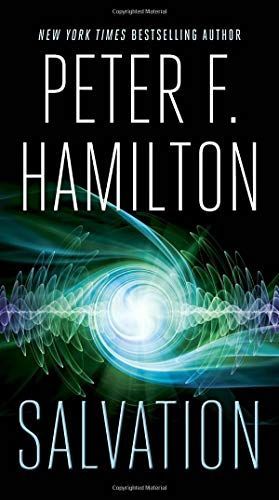
Salvation
Humanity's complex relationship with technology spirals out of control in this first book of an all-new series from "the owner of the most powerful imagination in science fiction" (Ken Follett). "How far 'space opera' has come! The Old Masters of sci-fi would admire the scope and sweep of Salvation."--The Wall Street Journal In the year 2204, humanity is expanding into the wider galaxy in leaps and bounds. Cutting-edge technology of linked jump gates has rendered most forms of transportation--including starships--virtually obsolete. Every place on Earth, every distant planet humankind has settled, is now merely a step away from any other. All seems wonderful--until a crashed alien spaceship of unknown origin is found on a newly located world eighty-nine light-years from Earth, carrying a cargo as strange as it is horrifying. To assess the potential of the threat, a high-powered team is dispatched to investigate. But one of them may not be all they seem. . . . Bursting with tension and big ideas, Peter F. Hamilton's Salvation is the first book of an all-new series that highlights the inventiveness of an author at the top of his game. Praise for Salvation "[A] vast, intricate sci-fi showstopper . . . The journey grips just as hard as the reveal."--Daily Mail (U.K.) "Exciting, wildly imaginative and quite possibly Hamilton's best book to date."--SFX "Dynamic, multifaceted characters, strong mind-expanding concepts, and impressive flair for language [make Salvation a] rare celestial event. . . . One of Britain's bestselling sci-fi authors has launched an addictive new book as the initial stage of what is sure to be an intriguing new series called the Salvation Sequence."--SyFyWire "Peter Hamilton just keeps getting better and better with each book, more assured and more craftsmanly adroit, and more inventive. [Salvation is] a bravura performance from start to finish. . . . Hamilton is juggling chainsaws while simultaneously doing needlepoint over a shark tank. It's a virtuoso treat, and I for one can hardly wait for Salvation Lost."--Paul Di Filippo, Locus "Peter F. Hamilton is known as one of the world's greatest sci-fi writers for a reason. . . . Salvation is well worth the effort and a great introduction to some good old-fashioned space opera."--Fantasy Book Review
Reviews
Shona Tiger@shonatiger
James Paden@jamespaden
Cindy Lieberman@chicindy
Bryan Alexander@bryanalexander
Ian Mason@thedimpause
Mike Cooper@drfeces
Klaus Eck@klauseck
Martin Weitzel@mweitzel
Scordatura@scordatura
Scordatura@scordatura
Matthew Rasnake@coffeemonk
Benjamin Snipes@bengsnipes
The Hissing Saint@thehissingsaint
The Hissing Saint@thehissingsaint
Alexander Neumann@alex23
Alexander Neumann@alex23
Benjamin@ben729
Benjamin@ben729
Stewart Scott@stewart
Stewart Scott@stewart
Xavier Roy@xavierroy
Chelsey@chelsklassen
Chelsey@chelsklassen
Dave Lehman@dlehman